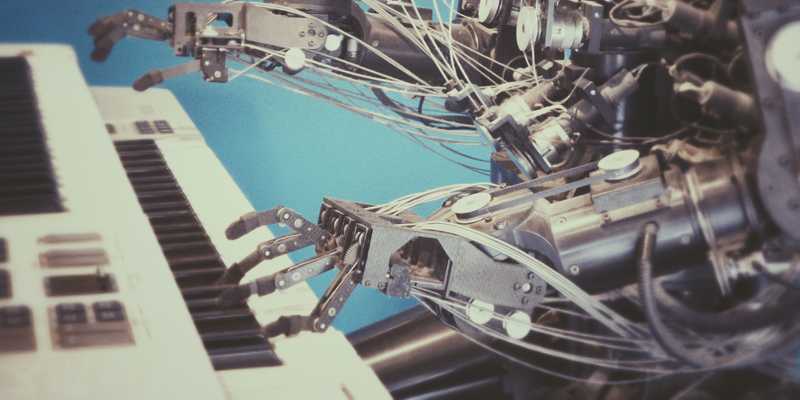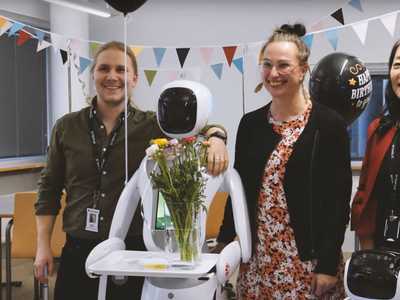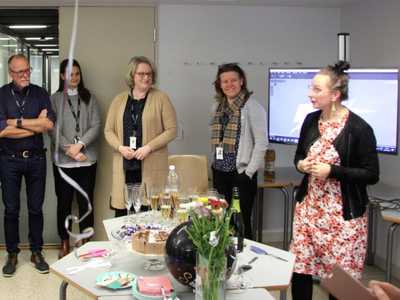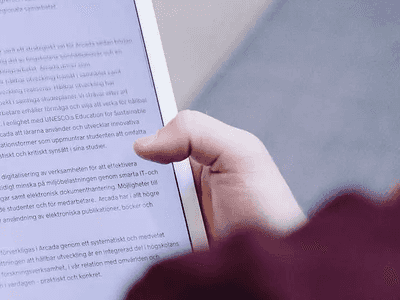AFORA

Humanoid social and service robots

Summary
Background and goals
As a multi-professional university of applied science, we educate for the future, for professions and a work life we cannot fully foresee.
The AFORA (Amy for Arcada) project is our effort at Arcada to develop first-hand knowledge and understanding about robots and robotic services, and to explore ways that we can incorporate robots into Arcada’s learning experiences. The initiative highlights challenges of the modern world that we are already part of.
We want to provide hands-on experiences with service robots for students and staff, as well as raise interest, insight and learnings related to robotics in educational settings.
When working with the robots we want to provide an interdisciplinary opportunity to learn more about the technology of AI and robotics, while keeping a reflective, ethical and critical eye on the developments in the field.
As a part of the project we also work on creating relevant use cases for different service sectors. For example for the hospitality sector.
Team members:
- Christa Tigerstedt
- Dennis Biström
- Amin Majd
- 2-4 IT students
- 2 thesis researchers
Humanoids:
- Alf (Sanbot Elf)
- Amy (csjbot.com)
- Snow (csjbot.com), from March 2021
Collaboration with other projects such as MäRI and AI Driven Nordic Health and Welfare.
The project is sponsored by the A.F Lindstedt foundation.
Objectives and benefits
Our project activities will include both education and research components. During year 2020 the new learning experience would be directed towards business and engineering students (i.e mainly the Department of Business Management and Analytics) to create synergies there and to help the students think of new business models as well as development of customer service in different sectors. For the engineers the service robot could display live examples of advanced AI technology and spark interests in AI research and competency development. The courses of Service design, Hospitality Management and for example Entrepreneurship (International business and Företagsekonomi, Christa Tigerstedt), Matematisk programmering (Informationsteknik, Dennis Biström) and Computer vision (Informationsteknik, Dennis Biström/NN) will pilot with the introduction and use of the robots in classes and course projects.
During year 2021, in addition to extend to more courses in business and other relevant subjects, plans include the development use cases for hospitality (hotel reception, room service etc), logistics and retail.
Pilot investigations into these areas already started and are ongoing as this application is being written. The current activities are focused on conducting a few pilot workshops and with the students in service design, methodology and web services. In total we involve about 200 students in these pilots.
In the fall we continue with piloting in the hospitality course as well as in two programming courses. In parallel, and as results of the integrations, we’ll be collecting initial data and write down insights from our learning process which will become publications at a later stage.
This project is also a small-scale research project where we research our own practice and the field of humanoid service robots in both educational use case and service use case contexts. The research will explore a set of questions: what are good ways to interact with robots, what are the advantages and limitations of robotic services, what do you think are the future of robotics in businesses and services, how robots can best assist students and teachers, is it possible that robots will replace teachers, what parts of teaching work can be replaced, which parts best kept to us; Identify ethical issues, equality issues surrounding the use of robotic services (Methods: literature study, survey, interviews, focus groups, etc).
The research part of the project will continue looking at the methods and techniques for human-machine dialogue, and understand the issues and implications of services. Our students can also be part of the research activities in courses, and in their final thesis projects and industrial future. Two research articles will be delivered.
Our deliverables are in other words related to the following:
-
development of simulation platforms for learning about robotics as well contributing to the creation of a robotics lab at Arcada
-
development and learning for smart digital solutions
-
fosters new thinking as well as innovation and an entrepreneurial approach among co-workers and students for applications in current and future work life
-
is a truly cross-disciplinary project and a project that stresses the importance of cross-disciplinarity
-
includes a sustainable (and ethical) perspective on AI and robotics
Results This project will deliver at least two articles, ten workshops with students, four use case scenarios, ten use case presentations and presentations of learning simulations with students in different contexts.
The results and impacts of our project will be reflected in these aspects:
-
Learnings for the students: The project is integrated into several courses (service design, computer vision, web services, entrepreneurship etc). Technically the bot(s) are interesting to work with for student both when it comes to creating new service models in business and when learning about code and coding. Also, having bot like Sanbot Elf and Amy can encourage and motivate student to in class build something similar during the course that take at Arcada. It could be done as a step by step project with them starting year one and ending year two for example. At least 200 students will take part in the project learning activities in one way or the other. Students work in multi-professional teams and gain relevant soft skills along the way.
-
Learnings for teachers and co-workers: This can create new ways for teachers to think about possible future oriented content and will give new possibilities to demonstrate and concretize future developments in work life for the students.
-
The wider society. The project will raise interest among different Arcada stakeholders, for example future student and work life partners visiting Arcada. Also work-life partners will be introduced to the project and what we do. This latter point is important for the creation of relevant use case in the future. Different sectors involvement is important.
Societal impact
Future proofing of education and work life in general.
Abstract
Humanoid robots in service contexts –insights from training sessions with end users (in progress)
Teaching and learning with humanoid social and service robots in higher education
https://iated.org/concrete3/view_abstra… External link
Using humanoid robots in social distancing -A meta-heuristic approach (in progress)
Publication abstract: https://iated.org/concrete3/view_abstra… External link
People

Christa – Head of RoboLab
Ms Tigerstedt (PhD) is a trainer, project manager and researcher at the Department of Business Management and Analytics at Arcada UAS.
See profile
Dennis – Head of DevLab
Dennis Biström is an IT-Lecturer and Researcher at Arcada UAS where he teaches full stack web programming and data managing, visualization and engineering. He is a PhD student at Åbo Akademi where he is researching human robot interaction (HRI).
See profileRecent Posts

Welcome Amy and Alf
AFORA (Amy for Arcada) is a learning and development project where we, together with students and co-workers, explore possibilities with…
Read more about Welcome Amy and Alf
Robot shower
The robots have arrived at Arcada, and we wanted to show them off! The AFORA research team held a robot shower (baby shower but for robots…
Read more about Robot shower
Frequently asked questions - Amy & Alf
Some questions arise more often than we care to answer them. That’s why we put them here, so that we don’t have to answer them! “Cute, but…
Read more about Frequently asked questions - Amy & AlfPublications
Teaching and learning with humanoid social and service robots in higher education -learnings from service design and it framework use case development modules. Available at: https://library.iated.org/view/TIGERSTEDT2021TEA